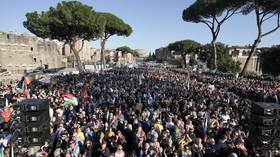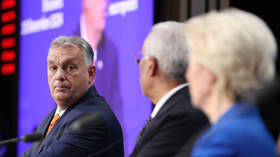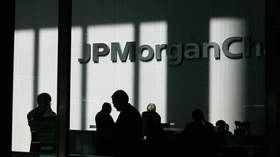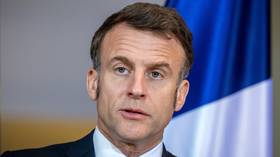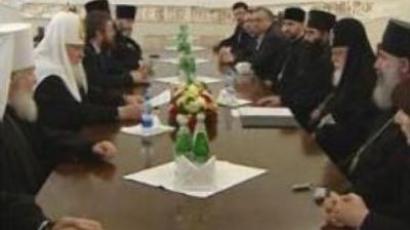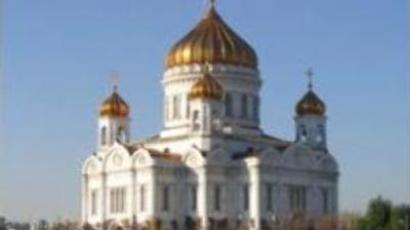Late Patriarch finds final resting place
The head of the Russian Orthodox Church, Patriarch Aleksy II has been laid to rest at the Epiphany Cathedral in Moscow. While thousands came to bid their final goodbye to the Patriarch before the burial, the solemn ceremony was not open to the public, wit
Mourners will be allowed to visit the grave starting from Wednesday, December 10.
Earlier, thousands gathered in Moscow’s Christ the Saviour Cathedral to pray for Aleksy's soul. The six-hour service was led by Aleksy II's temporary replacement, Metropolitan Kirill. He also headed the commission overseeing arrangements for the funeral.
Paying tribute at the funeral, Metropolitan Kirill said Aleksy II had inherited the Church “in a weak condition”.
He said the faith had been “unable to achieve its entire potential to bring the word of life to the people… after decades of repressions”.
However, Kirill said, “His Holiness left quite another Church behind him. Our hands and our feet are not trembling because the Church is now together with its people.”
“All his life was filled with good deeds. But what will go down into history is that he started out when the church was weakened and isolated by years of persecution. Now the church is united with its people,” he said.
Religious leaders from the CIS countries and around the world travelled to Russia for the event. The Patriarch of Constantinople and the head of the Georgian Orthodox Church were among those taking part in the ceremony.
Russia's President Dmitry Medvedev and Prime Minister Vladimir Putin were among the mourners.
Security had been stepped up in central Moscow for the day, with 6,000 police and troops drafted in for the funeral.
The burial ceremony took place in the Epiphany Cathedral on Elokhovskaya Square.
Aleksy II died aged 79 on Friday after 18 years as head of the Russian Orthodox Church.
More than 80,000 mourners have filed past the coffin since it was opened to the public late on Saturday evening.
Pope Benedict XVI said prayers for the soul of the late Patriarch. He said Catholics are united with their Orthodox brothers in their grief. The Pope’s comments, made during his Sunday blessing, show a thawing of previously frosty relations between the two churches.
Those who knew him personally remember the late Patriarch as a loved and respected man.
Archbishop Antonio Mennini, Papal Nuncio to the Russian Federation said: “I loved him dearly because I felt that he was above all a great man, a man of faith and a true spiritual leader.”
Berl Lazar, Chief Rabbi of Russia said the Patriarch was a unique person, “unique not only for Orthodox believers, but for Jews as well…He did a lot to harmonise relations between confessions,” he said.
Metropolitan Kirill of Smolensk and Kaliningrad will hold the post until a permanent leader is elected within the next six months.
In the days after the funeral, the Holy Synod will decide on a meeting-date for the Assembly of the Hierarchs. It will then be for the National Council of Bishops to elect a new Patriarch.
President Medvedev had earlier signed a decree suspending entertainment events on the day of Aleksy II’s funeral. The ruling will affect cultural institutions as well as TV and radio channels.
Aleksy II will be remembered as the first Patriarch of a new Russia. He led the revival of the Russian Orthodox Church after Soviet repression, and united it with congregations abroad after the 90 year split which followed the Bolshevik Revolution.
Born in Estonia in 1929 to a priest, Aleksy Ridiger began what would become a lifetime of religious and diplomatic work. He drew his inspiration at a monastery in Yikvi, Estonia, where he became a priest at 21.
Ordained in 1950, he returned to Estonia and was later appointed the country’s bishop. But much of his work soon went beyond religion and into politics.
For more than 25 years he worked in a conference of European churches, a body set up at the height of the Cold War to promote dialogue and friendship.
In times of harsh economic reforms and a shift in public values, Aleksy did his utmost to defend morality and faith during the 90s.
He was close to Soviet dissidents like the late Russian writer Aleksander Solzhenitsyn, whose widow Natalya thinks the Patriarch’s death is a huge blow.
“It’s a great personal tragedy for me and my family, we knew the Patriarch well,” she said. “When we returned to Russia from the States, my husband and I had a long meeting with the Patriarch. Not long before his death, Solzhenitsyn wrote to the Patriarch asking for permission to be buried in the Donskoy Monastery. Aleksy gave his consent. So, it’s all very personal for me. The situation is difficult in Russia and the whole world now. And losses like the Patriarch’s death should be a call for unity. Hard times are ahead.”
Aleksy II traveled widely, visiting more than 100 dioceses as Patriarch and encouraging congregations to come back to the fold.
And at the end of 2006 there were more than 27,000 active parishes throughout the old territory of the Soviet Union.
He was active internationally, presiding over the reunification of the Russian Orthodox Church with the one outside of Russia in May 2007. The two churches had separated in the early 1920s.
But relationships with other faiths proved more difficult. Aleksy refused to meet with the Pope, accusing the Catholic Church of aggressive missionary policies in both Russia and traditionally Orthodox former Soviet republics. He in turn was accused of making the church a force for nationalism.
But no Russian would deny he united the country after decades of harsh policies and turbulence. Today two-thirds of Russia’s population are Orthodox followers and are mourning their tremendous loss.



